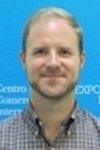From Halifax to Geneva
Craig Atkinson’s undergraduate degrees in business and economics took him across Canada—his Master of International Trade (MIT) from the Johnson Shoyama Graduate School of Public Policy has taken him around the world.
By Bev Fast, Saskatoon-based freelance writer.
A Career in International Trade and Development

Originally from Halifax, Nova Scotia, Craig earned his bachelor’s in business and economics from Bishop’s University in Quebec. “At Bishop’s I participated in the business school’s co-op program, so I lived and worked in cities across Canada. My final placement was as a consultant with Australian Trade Commission (Austrade) in Toronto. It was my initial foray into export promotion,” Craig says. “My career has been focused on international trade ever since.”
Upon graduation from Bishop’s, Craig found himself in a tough job market. “That led me to take another step toward a career in trade. I moved to Saskatchewan in 2010 to work for the Canadian Trade Commissioner Service (TCS). In this role, I advised Saskatchewan-based enterprises on how to access export markets. It was interesting work: the focus was mainly on clean technology, IT, and agricultural equipment sectors.”
The assistant trade commissioner position brought Craig’s interest in international trade into sharper focus. He began exploring educational options and found the MIT program at the Johnson Shoyama Graduate School.
Discovering the MIT
Johnson Shoyama’s Master of International Trade (MIT) is a course-based graduate program, delivered online, that brings together practical experience and academic expertise in an interdisciplinary approach to international trade. The courses cover a broad range of political, economic, technological, legal and social issues associated with trade.
“I was drawn to the program because it covers all aspects of international trade. The multidisciplinary approach made it a challenge, but at same time, it is essential to study all of these areas because they’re interconnected,” Craig says.
Previous work with Australian and Canadian trade commissioner agencies also sparked an interest in studying institutions and the role of public sector agencies in trade promotion. One of his projects was an examination of the efficacy of national trade promotion organizations.
Looking back on his journey through the program, Craig remembers the biggest challenge. “The reading— you’re constantly reading,” he says. “And many of us were also working full-time, so that added to the challenge. I was an independent consultant in Canada during my first year of the program and an intern in Geneva during my entire second year.”
Studying Online, Working Abroad
Craig had been actively searching for internship opportunities when he applied for, and won, a highly coveted internship with the International Trade Centre (ITC), a joint World Trade Organization-United Nations agency based in Geneva, Switzerland. The ITC’s mission is summed up by its tagline, “Trade Impact for Good.” The ITC supports developing and transition countries in seeking out and developing export opportunities leading to economic growth, job creation and poverty reduction.
“I was looking for an internship opportunity in trade and development, and I was interested in going overseas, but I also wanted to work for a relevant agency. ITC is a leading trade and development agency in the United Nations system,” Craig says. He clearly remembers “getting the call.”
“It was exciting, not just because I was moving to Switzerland, but also because I would be working in the area I was studying. It made my investment in graduate-level education seem worthwhile.”
Craig landed in Geneva in late September 2012. “Geneva is a very global city. It’s a city where like-minded people come together. That makes it a great place for building a network and meeting people from around the world.”
Despite the 7,346 km distance, the online nature of the MIT program made staying connected to Johnson Shoyama easy … mostly. “The eight-hour time difference was tough. There were many nights I’d be up past 1:00 a.m. in Skype sessions related to the coursework,” Craig remembers.
His internship led to a role as an international consultant with ITC. Recently, in conjunction with colleagues, Craig has been involved in the development of a “global needs analysis”; a content analysis of 60 sector development implementation plans across agri-food, manufacturing and services sectors. “It is an exciting report because it looks at ITC’s sector development work, over a 10-year period, and provides insight into key challenges and opportunities expressed by beneficiaries in different regions and sectors,” says Craig.
The Next Step
Also a Certified International Trade Professional (CITP), Craig continues to develop his expertise in international trade and development as a graduate fellow as part of a Master of Arts (MA) program at the University of Saskatchewan. For his thesis, he is looking at the impact of the transfer of small-scale peanut processing technology from international donors to smallholder farmers in Sub Saharan Africa, an extension of work he was involved in at the ITC.
“This winter, I hope to complete the fieldwork, which involves working with farmers in Africa who were the recipients of appropriate technology from international donors,” Craig says. “I’m excited about that. I’ll also be back and forth to Geneva to work on projects, and I’m continuing to develop the capacity of my consulting company. My goal is to continue to consult with different UN agencies in agricultural development while exploring technology-oriented entrepreneurship.”

